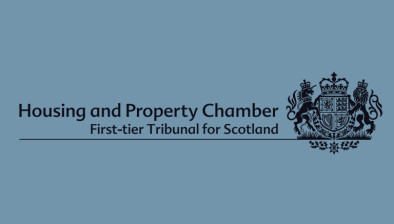Glasgow man granted permission to represent himself in proceedings against GHA

The Upper Tribunal for Scotland has granted an appeal against a decision of the First-tier Tribunal for Scotland Housing and Property Chamber to exclude an applicant from representing himself in proceedings raised against a housing association.
The appellant originally applied for a determination that The Glasgow Housing Association Ltd had breached the Code of Conduct for Property Factors. He was excluded from presenting further arguments by the FtT due to his conduct during the hearing.
The appeal was heard by Sheriff Iain Fleming.
Endeavoured to control himself
The FtT hearing took place on 19 March 2019. The appellant represented himself while the respondents were represented by a solicitor, Mr Adams. Shortly after the hearing began an issue arose as to the entitlement of Mr Adams to represent the respondent. While the FtT resolved the issue the appellant verbally interrupted proceedings on two occasions.
There were further interruptions by the appellant at various points later in the hearing. After the second interruption he was warned by the FtT chair that further interruptions could result in him being excluded from proceedings.
Following a fourth interruption, the FtT took the view that the respondent’s representative was entitled to make submissions without interruption. It was noted by the FtT that the appellant suffered from poor mental health and that he had “endeavoured to control himself”, but it was decided that he should be excluded from presenting further submissions or questioning witnesses in the present hearing and any future ones.
The FtT adjourned the hearing to allow the appellant to find and instruct a representative to make submissions on his behalf. It was noted that the FtT did not exclude the appellant from being in the room, but it was clear the FtT would not allow him to participate further without representation.
On appeal, the appellant submitted that the FtT had breached the rules of natural justice and had taken into account “things it should not have” in making its decision. Permission to appeal was originally refused by the FtT and Upper Tribunal but was later granted by the UT on the basis of written submissions only.
The respondents took a “neutral” stance to the appeal, neither consenting to nor opposing it.
Sympathy for the chair
In his decision, Sheriff Fleming noted that the FtT had the power to exclude persons disrupting proceedings by virtue of Rule 34 of the HPC’s rules of procedure. He also noted: “In terms of the Overriding Objective and its Effect the FtT is obliged to ensure, when exercising any power under the regulations, so far as practicable, that the parties are on an equal footing procedurally and are able to participate fully in the proceedings.”
He continued: “It was the perception of the FtT that the appellant was unable rather than unwilling to control himself. The effect of the order of the FtT is to prevent the appellant from participating in any future hearing in any fashion without the benefit of representation.”
On the nature of the interruptions, he said: “The Upper Tribunal has considerable sympathy for the FtT Chair. It rather appeared that much time had been spent upon matters which are not germane to the issues before the FtT. The appellant had repeatedly interrupted and had frustrated the disposal of the case.”
Sheriff Fleming then considered the circumstances in which it would be appropriate to exclude a party, saying: “The decision to exclude a party is one which should be taken with considerable restraint and discretion. While no criticism can be made of the FtT’s decision to admonish the appellant about his repeated interruptions, it rather appears that at no time prior to the decision to exclude the appellant was any enquiry made as to whether the appellant would have benefited from regular breaks in proceedings, or whether a supporter for the appellant could be obtained.”
He continued: “There does not appear to have been enquiry into whether a short break in proceedings to allow the appellant to marshal his equilibrium such that he could have briefly absented himself before being invited back into the hearing room and enquiry made as to whether the hearing could continue without further interruption. Further, no enquiry appears to have been made as to whether there were any alternative ways in which the appellant could participate.”
Regard to alternative measures
Referencing the FtT’s obligation to consider alternatives to exclusion, he said: “That does not appear to have been done. The hearing was proceeding, albeit not without difficulty. The FtT ought to have had regard to alternative measures and considered whether the exclusion resulted in the appellant being adequately represented.”
Applying the FtT’s Overriding Objective to the case, Sheriff Fleming said: “When the FtT determined that the appellant should be excluded in the fashion indicated the FtT had a continuing duty to review the position. To determine, without allowing the appellant recourse to review, that the hearing would proceed to its conclusion absent participation by the appellant unless he obtained representation does not adhere to the Overriding Objective.”
He concluded: “The behaviour of the appellant before the FtT was sustained, disruptive and clearly worthy of sanction. The FtT hearing could not have proceeded without intervention from the Legal Chair. However, the regulations have been devised to deal with those who frustrate the progress of hearings. In the circumstances of this hearing the FtT appears not to have had regard to whether the appellant was adequately represented in light of the exclusion, failed to have regard to alternative measures and provided no opportunity for review of its decision.”
For these reasons, the appeal was allowed, and the exclusion order set aside. In relation to the application itself, Sheriff Fleming ordered that it should be recommenced before a differently constituted FtT.





